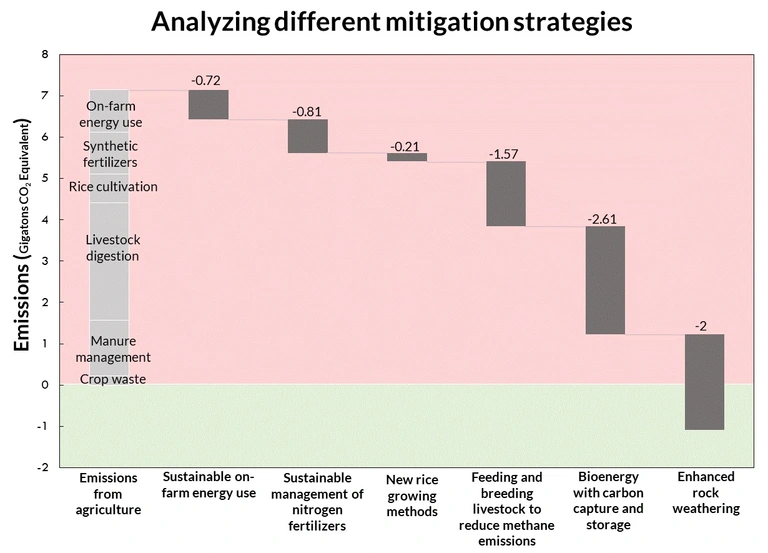Washington, DC—Technological innovation and investment will be needed to reduce agriculture-related greenhouse gas emissions to zero, according to new work from Carnegie Staff Associate Lorenzo Rosa and Visiting Scholar Paolo Gabrielli. Their findings were recently published in Environmental Research Letters.
“Right now, farming is responsible for about 12 percent of all global greenhouse emissions,” Rosa explained. “Agriculture is not only a significant contributor to climate change; it is also one of the first victims of its consequences, including warming, drought, and altered precipitation patterns.”
Rosa and Gabrielli set out to analyze a variety of technologies for reducing the amount of greenhouse gas emissions that are released by agriculture to see how far these tools could take us on the road to zero emissions. Reducing agricultural emissions is particularly challenging because most agricultural greenhouse gas emissions come from methane and nitrous oxide, both of which have a much greater warming potential on short time scales than carbon dioxide.
They probed the effectiveness of different methods for cutting back greenhouse gas emissions from agricultural activity, including use of alternative energy sources on the farm, more sustainable fertilizers and pesticides produced with net-zero emissions, fertilizer management, feeding and breeding strategies for reducing livestock methane emissions, and alternative rice cultivation techniques that minimize the growth of methane-producing microbes in flooded soil
Agricultural decarbonization strategies rely heavily on using carbon-free energy sources, according to Rosa and Gabrielli. Successfully implementing them would entail integrating renewable energy systems into farm operations and developing sustainable methods for producing fertilizers, pesticides, and other relevant chemicals. Implementing smart and sustainable irrigation practices is not only crucial for improving water sustainability but also for reducing energy consumption and methane emissions associated with rice cultivation.
Rosa and Gabrielli found that technology could help farmers lower agricultural greenhouse gas pollution by up to 45 percent. However, getting to zero carbon emissions will require carbon dioxide removal strategies that are expensive and currently not widely deployed.
Approaches they found particularly promising involve a combination of sustainably produced bioenergy usage and techniques that capture emissions from these energy sources in long-lasting geological formations. Another auspicious possibility was the idea of speeding up the natural rock erosion process, which also removes carbon dioxide from the atmosphere. Together, such technologies could turn farming from a sector that deposits carbon into the atmosphere into one that withdraws it. The study also discusses novel technologies that extend beyond the boundaries of traditional agriculture, such as methane removal and farm-free production of some foods.

However, Rosa and Gabrielli indicated that more research is needed to make these tactics affordable and scalable, as well as to understand their wider impacts.
“Innovations in irrigation and fertilizer have improved global crop yields, but this increased production ignores the climate impacts of the strategies upon which it depends,” Gabrielli said. “As warming increases, it will become increasingly difficult to produce enough food for a growing population and novel approaches that take climate mitigation into account will be necessary.”
Sustainable agricultural practices could also improve energy security, water scarcity, and biodiversity loss, according to Rosa and Gabrielli, who are committed to examining the intersection of agriculture and climate change from every angle and to building a blueprint that will facilitate the shift to net-zero emissions from agriculture. However, they indicated that success is going to require an interdisciplinary effort undertaking that involves plant science, hydrology, engineering, economics, and political science.
Rosa joined Carnegie last year as a Staff Associate—a prestigious program designed to give young scientists the freedom and independence to pursue bold and unconventional research. His overall research program aims to understand the agricultural challenges posed by climate change and to assess various ways to improve agricultural sustainability. During his tenure at Carnegie, his efforts have included analyses of irrigation strategies, soil moisture-retention techniques, and water storage needs, as well as evaluating solutions to reduce the carbon footprint of fertilizer production.
